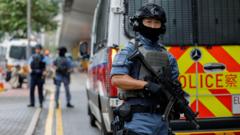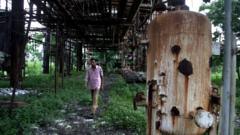A Hong Kong court has sentenced 45 pro-democracy leaders, including prominent figures Benny Tai and Joshua Wong, to prison for subversion under the national security law. The trial and sentences signal a significant crackdown on dissent and further entrench Beijing's control over the city.
Hong Kong Sentences 45 Pro-Democracy Activists in Landmark Subversion Case

Hong Kong Sentences 45 Pro-Democracy Activists in Landmark Subversion Case
Court delivers harsh penalties under national security law, igniting outrage and concern for democracy in the region.
In a historic ruling, a Hong Kong court has sentenced 45 pro-democracy campaigners to substantial prison terms for subversion, further tightening Beijing's grip on the city. This comes as part of a controversial national security trial viewed by many as a significant blow to the pro-democracy movement, which has faced immense pressure since 2019.
Among those sentenced was Benny Tai, aged 60, who received a 10-year prison term, and Joshua Wong, 28, who was handed a sentence of over four years. This group, often referred to as the Hong Kong 47, included activists and lawmakers who sought to prepare opposition candidates for local elections. The unprecedented trial resulted in a total of 45 convictions, while two defendants were acquitted in May.
The trial was the largest conducted under the national security law (NSL), which was imposed by China in response to massive protests that erupted in Hong Kong in 2019. Initially sparked by a proposed extradition treaty with mainland China, the protests escalated, broadening into calls for democratic reforms. Critics argue that the NSL has substantially eroded the rule of law and stifled political dissent in the region.
The Chinese and Hong Kong governments defend the NSL as vital for safeguarding stability and assert that the severe sentences serve as a cautionary message to others who might challenge national security. "No one can engage in illegal activities in the name of democracy," a representative from China's foreign ministry stated on Tuesday.
The response from pro-democracy advocates has been one of profound disappointment. Emily Lau, former chairman of the Democratic Party of Hong Kong, expressed sorrow for the convicted activists and their families, highlighting the overwhelming public interest in the trials as many eager Hongkongers awaited entry but were turned away due to the courtroom's capacity limits.
Prominent figures among the sentenced have long been recognized for their roles in the protest movement. Tai, who emerged as a leader during the 2014 Umbrella Movement, led the initiative for an unofficial primary election, aimed at amplifying opposition voices. Wong, active in activism since his teens, had been in jail prior to this trial for previous protests.
Support from the community was palpable outside the courtroom. Attendees like Lee Yue-shun, one of the acquitted defendants, encouraged onlookers to critically engage with the implications of the case. An elderly protester rallied support for the jailed individuals, while emotional family members watched anxiously as lengthy sentences were announced, ranging between four to ten years.
The lengthy sentences imposed during this trial have drawn condemnation from international observers, with the UK government critiquing the NSL's use to criminalize political participation. What has ensued is a stark warning to those who dare to oppose the pro-Beijing government, with experts like John P Burns suggesting the trial illustrates a continued effort to instill fear regarding national security matters in Hong Kong's populace.
In the aftermath of this ruling, many argue it represents a concerning precedent for the magnitude of consequences faced by those advocating for pro-democracy ideals within the city. As the once-vibrant landscape of political dissent quiets, fears grow that Hong Kong's identity as a bastion of freedoms continues to erode under the weight of Beijing’s intervention. The continued lack of public rights to protest further cements the notion that a generation of activists has been lost to a rigid regime, drastically changing the city's narrative and aspirations for democratic governance.





















